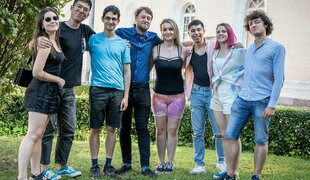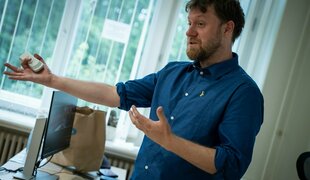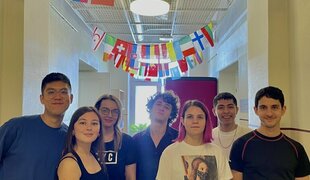The Politics of Popular Culture
On-site in Tartu 28 July - 8 August 2025
Though often dismissed as “just a bit of fun” (Way, 2021), popular culture’s role in influencing and reflecting broader political developments is finally starting to receive the academic attention it deserves. From Banksy’s street art, to the Olympic games, via the Eurovision Song Contest and even our favourite food, popular culture is the medium through which we most often experience and consume politics as part of the “taken for granted everyday world” (Machin, 2013).
Yet it is precisely this inseparability from the ideologies and power relations with which it is infused (Machin, 2013), that makes popular culture such a challenging and important subject for academic research. Perhaps nowhere is this more evident than in Ukraine, where popular cultural fields including sport, art and music have been described as a geopolitical battlespace (Saunders, 2024), shaping perceptions and representations of Ukraine in the public sphere (Gaufman and Kurylo, 2024).
This course provides an overview of the methodological tools required to assess a diverse range of research questions related to politics and popular culture, including Critical Discourse Analysis (CDA) and Multimodal Discourse Analysis (MMDA). Interactive seminars and lectures on the course introduce students to the key theoretical, practical and methodological issues affecting the ways politics interacts with popular culture.
In 2025, the course will take full advantage of the interactive and immersive learning environment in Tartu to reflect on the legacy of the city’s year as European Capital of Culture. Through meetings with leading experts and practitioners in the Estonian cultural sphere, students will come away with a strong awareness of some of the most important issues affecting the relationship between politics and popular culture in Estonia and beyond, as well as a solid foundation from which to explore their own areas of interest further.
During this course, the students will deepen their understanding of the ways politics and everyday culture interact, and be encouraged to explore specific case studies including the use of football as a political tool by populist leaders, music as a means of integration for Estonia’s Russian speakers and expressions of national identity through everyday food products. The learners will also develop their knowledge of these case studies further through a group class project and written assignment.
Extended application period: 5 May - 20 May 2025
NB! All of the applicants are required to pay a non-refundable application fee (read more here) of EUR 25. Your application will only be processed after the University has received the fee. The application fee is required to facilitate the admissions process and will not be refunded, regardless of the admission result.
Information about the course
Focus area: | Politics, culture | Coordinating unit: | Johan Skytte Institute of Political Studies |
Study Field: | Political Science | Course Leaders: | Michael Cole, University of Tartu |
Format: | Summer Course | Location: | Lossi 36, Tartu |
Course dates: | 28 July - 8 August 2025 | Language: | English |
ECTS: | 3 | Study group: | MA/advanced BA/early stage PhD students |
Lecturers
Michael Cole | Guest lecturers |
| PhD Candidate in Political Science at the Johan Skytte Institute of Political Studies. His research focuses on understandings of national identity and populism in Ukraine and Georgia. He has published academic articles and book chapters on the relationship between politics and football, politics and art and politics and music. | TBA |
Course fee: 550EUR
Includes:
Study materials
10 days of academic work with lecturers
Certificate of completion (3 ECTS)
5 cultural events in the evenings
NB! Transportation and accommodation costs are not included. The course fee does not cover participant's lunch during the summer school.
NB! This is a preliminary programme. The final schedule will be sent to the participants two weeks before the course starts.
Sunday, 27 July
Arrival in Tartu
Day 1: Monday, 28 July: What is the politics of popular culture?
- Class Introduction and Welcome
- Lecture and Seminar "What is the politics of popular culture?" (Focus on Ukraine)
- Biopolitics and Popular Culture (Focus on Georgia and Poland)
Day 2: Tuesday, 29 July: The politics of popular music
- Lecture and Seminar - The politics of music part 1 (Focus on Narva, Estonia)
- Lecture and Seminar - The politics of music Part 2 (Using CDA and MMDA)
- Introduction to group project work
Day 3: Wednesday, 30 July: The politics of music continued
- Lecture and Seminar – The politics of music part 3 (Focus on Tallinn Music Week)
- Introduction to course assignment – how to write a popular science article workshop
- Study trip / Guest speaker(s) TBC
Day 4: Thursday, 31 July: The politics of street art
- Lecture and Seminar - The politics of street art part 1 (Focus on Poland)
- Lecture and Seminar - The politics of street art part 2 (Using MMDA)
- Group work and individual consultations
Day 5: Friday, 1 August: The politics of street art continued
- Political street art “treasure hunt” in Tartu
- Guest Speaker(s) or Tartu- based street art activity
Saturday, 2 August: free day
Sunday, 3 August: free day
Day 6: Monday, 4 August: The politics of sport
- Exploring Intertextuality (Focus on Tartu Street Art)
- Politics of sport part 1 (Focus on populism and football)
- Politics of sport part 2 (Focus on football and the far right)
Day 7: Tuesday, 5 August: The politics of sport continued
- Politics of sport part 3 (Focus on current sporting events)
- Politics of food part 1 (Focus on populism and social media)
- Group Work
Day 8: Wednesday, 6 August: The politics of popular culture in Estonia (Music and Arts of Survival)
- Excursion to Viljandi (TBC)
- Workship at Estonian Traditional Music Centre (TBC)
- Street art tour of Viljandi (TBC)
Day 9: Thursday, 7 August: The politics of food
- Discourse: Post-foundationalism and Critical Discourse theory
- The politics of food part 2 (Focus on Estonia and identity)
- Group Work
Day 10: Friday, 8 August: Presentations and course end
- Group project presentations
- Course summary and feedback
Saturday, 9 August/Sunday, 10 August
Departure
Upon completing the course, learners will be able to:
- Analyse ways politics and popular culture interact in a wide range of contexts.
- Apply methodological tools to examine relationships between popular culture and politics in academic research, including Critical Discourse Analysis (CDA), and Multi-Modal Discourse Analysis (MMDA).
- Explore the relationships between politics of popular culture for specific case studies of their own interests.
- Write about the connections between politics and popular culture in a style suitable for a broader non-academic audience
- Have the opportunity to publish an article about a topic of their interest with an established online media outlet.
Individual work will be given to the students before and during the course.
Students will be provided with focused readings and listenings prior to the course as well as optional supplementary materials, which they can access during or after the course depending on their specific areas of interest.
The mandatory reading and listening materials are as follows:
- Polese et al. (2017) "Identity and Nation Building in Everyday Post-socialist Life" – “Introduction: on informal and spontaneous national identities” (pp. 1-14).
- Podcast episode CBC (2024) “Eurovision’s Charge Political History”
- BBC (2022) “Love-bombing Estonia’s Russian Speakers”
- Velikonja (2020) “Post-Socialist Political Graffiti in the Balkans and Central Europe,” Chapter 1: “Mapping (political) graffiti and street art” (pp. 3-25).
- Popular Front (2022) “Frontline Hooligan: Ukraine’s Antifa Football Hooligans Fighting the Russian Invasion.”
- Polese et al. (2020) “National identity for breakfast: Food consumption and the everyday construction of national narratives in Estonia.”
Assignments:
- Group exercise (pass/fail): Students will give a presentation on a case study of their choice, which demonstrates and explores an aspect of the relationship between politics and culture.
- A short op-ed style assignment (Max 2000 words) on the same or a related topic for submission to a suitable outlet for publication.
Which previous knowledge is required?
Students are expected to have a general awareness of contemporary issues related to politics and popular culture.
Previous experience of qualitative research is an advantage.
Entry requirements:
- Online application form (application period April 1 - April 30 2025)
- Motivation letter (up to 1 page) that demonstrates the applicant’s motivation to participate, his/her expectations about the programme, how participation in the summer programme relates to his/her studies and interests, and how the applicant plans to use the gained experience and knowledge in the future.
- Transcript of academic records
- Copy of passport
PS: Only complete applications including all annexes submitted by the deadline will be considered for selection.
Participants' articles about the course
Lucija at the summer course “The Politics of Popular Culture" (read more here)
Daniela at the summer course “The Politics of Popular Culture" (read more here)
Photo Gallery
Check out the photos from previous years







